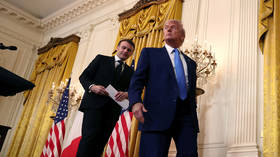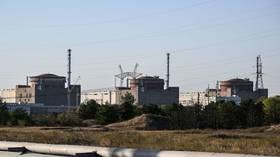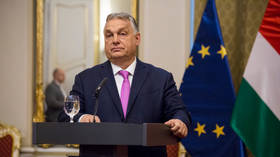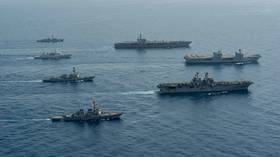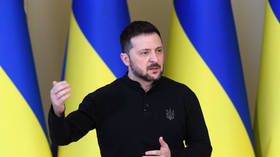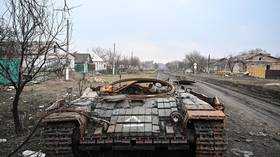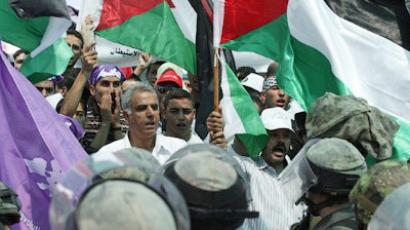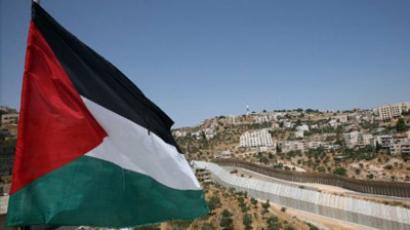‘We do not challenge legitimacy of Israel’ - Abbas
President Mahmoud Abbas has exclusively told RT that he cannot understand why the Palestinian bid for full UN membership and peace negotiations with Israel should not happen in parallel.
The Palestinian president is well aware of American and Israeli accusations of acting unilaterally in making a bid for Palestinian statehood at the UN, but, he says, Palestinians have been waiting in vain since 1947, when UN Resolution 181 on separate states of Israel and Palestine was adopted. Yet while the state of Israel was created, the Palestinian one has existed on paper only.Abbas insisted that it was not the existence or legitimacy of Israel that was being questioned, but the legitimacy of the occupation of Palestinian territories and ongoing Israeli settlement activities that are the stumbling blocks.RT: In the light of recent events in the Arab world that have come to be known as the Arab Spring, you, as an Arab leader and president, have declared a “Palestinian Spring.” The US is against that move. What is your position towards the current stance of the US?Mahmoud Abbas: Talking about the Arab Spring, the Palestinian Spring – the Palestinian spring is happening. Even before it was declared, our position was unambiguous: the Palestinians want the occupation to end – they want to put an end to the divide. These are their demands that they have always put forward. We went to the UN Security Council demanding Palestine be recognized as a UN member state. We have had that right since 1947, since Resolution 181 was adopted, forming two states – Israel and Palestine. Sixty-four years later, we want these states to actually be formed. The state of Israel has been created, but not the state of Palestine. Today, 64 years later, we want that state to be formed. Israel and the US are calling our actions unilateral, but when we address the entire world community, all 193 states, I don’t think they will see them as unilateral.Our actions cannot be compared to the construction of settlements on Palestinian territory. This is a unilateral action, whereas our bid to the UN is not. Furthermore, we do not want to challenge the legitimacy of the state of Israel. Israel is a valid state and we have recognized it. If the Arab peace initiative had been adopted, 57 Arab and Islamic states would have followed suit and recognized Israel. That means that we support the existence of the state of Israel and do not want to challenge its legitimacy or seek its isolation. The only thing that we want to challenge is the legitimacy of the policy of occupation, the legitimacy of Israeli settlement activities. This is our right and we demand it. The US and Israel say our action is unilateral. This is exactly why we have applied to the Security Council. Let’s just wait and see.As for the right of veto, we knew in advance and we were officially notified that Washington will use its veto during the voting on our bid. It’s clear that the US, as the dominant world power, wants to extend its support to Israel. But what concerns us most is that the US wants to force all the countries that took part in the General Assembly, big and small alike, in particular the members of the UN Security Council, to vote against Palestinian membership of the UN. This is the key concern for us. All the member states of the Security Council have the right to use or, as I would put it, misuse their right to veto. Of course, such a decision would be regrettable. But we will comment on it only after it’s taken – not today. RT:Mr. President, some say that the latest steps you have taken mark a new era in the Middle East peace process. The US monopoly on decision-making in this region has been shattered, and the Palestinian issue is now open to broad international discussion. How would you comment on that? Could the veto threat undermine your plans?MA: We took the floor at the UN General Assembly to declare that we are a state – indeed, an occupied state. They say we must first hold negotiations. But we don’t see why the two things – I mean the Palestinian bid for UN membership and the talks on a peaceful settlement – cannot go in parallel. Accession to the UN will mean recognition that Palestine is a country in a state of occupation. That will make our position absolutely clear. We are an occupied country that seeks to hold negotiations on all issues, including an end to an armed confrontation with Israel. I believe this is the right way to move forward, of course, provided that the other side has a genuine desire to go the right way.RT: Your historic speech has resonated through Palestinian society. But Hamas has expressed a different opinion. How did you perceive their stance?MA: I would not like to speak on the negative effects resulting from the position of Hamas. They say this was a unilateral action taken without prior consultations with them. But it’s a totally different story. You may have skipped the consultations, but you have come out with the right initiative. Then any talk of unilateral action will play into Israel’s hands. But there are also voices within Hamas, both official and unofficial, that have a different view, and we are aware of them. It’s been a week since my speech. It’s a done deal so I would not want to discuss the negative consequences. I want to point out that we need to come together and start the reconciliation process. The decision on that has been taken and hopefully in the near future it will be reached. RT: You have been talking about all-encompassing negotiations with Hamas. What does that term mean? MA: Everything. We cannot forget about Hamas, whether it is in power or in opposition like it is now. If we manage to achieve national reconciliation and conduct elections – they are scheduled for May but we are hoping they would take place earlier – and Hamas remains in opposition to the current government, then, as is done in all democratic states, the government will have to discuss all significant decisions with the opposition and the two sides will coordinate their actions. That was what I meant when I talked about all-encompassing dialogue. The future may turn out to be difficult and we might be forced to seek a deep mutual understanding to resolve the problems of our people together. This is not my personal struggle, and it is not a struggle of Hamas. Hamas and I both have to answer to our people. That is why any plan we adopt or any actions we take should be clear and transparent to everyone. People have to see where we are going, where we will stop and what our goals are.RT: The media, as they analyze your speech, tend to emphasize your call for government reform as the main precondition of national reconciliation. In what ways will the government be reformed?MA: I did not say I wanted to replace the government, but there is a lack of understanding of the principles of governmental constitution that we had agreed upon. We talked about a transitional government, comprised of independent members and technocrats. It is not a government of national unity. The transitional government has to organize elections in the country and I am responsible for that as head of the Palestine Liberation Organization. At present, we can discuss candidacies for transitional government membership. I think any candidates nominated by Fatah, Hamas, the People’s Front or any other movement are suitable as long as they fit the description of “independent technocrat.” If they do not fit these criteria, I cannot approve their candidacies. I need people that correspond with the transitional period, namely independent technocrat socialists. The transitional government will not have to solve any major political problems. The PLO manages negotiations and forming the government is one of the PLO’s responsibilities. The government will represent the Palestinian people in Palestine while the PLO will represent and be responsible for Palestinians in the global arena. If everyone understands that, then the issue will not become a sticking point. We will negotiate. If a candidacy cannot be approved, nominate another candidate, that is all there is to it. Being stubborn in this matter would only bring harm. I am declaring this openly.RT: Mr. President, you have said several times that you are not going to run for another term in office. Is it possible that public opinion might force your position to change after you have given your historic speech?MA: Taking part in presidential elections is not a matter of popularity. I have the people’s support today, but that might change tomorrow. I have said before that I will not run for another term. Another politician whom we shall all support might come into the spotlight. He will gain popularity and the love of the people, but that will be a result of his work and his achievements. For my part, I will not change my position. I have decided that I will not run for another term in office today, tomorrow, or in the future.




